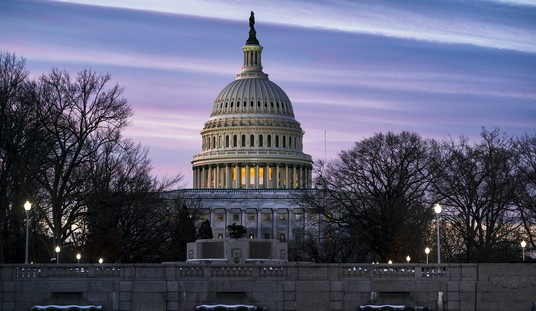There are a lot of reasons I don’t watch Republican political debates. One of them is that I might throw a whiskey glass at the television screen every time one of the contendors tries to show how tough he or she is by excoriating Vladimir Putin. Big talkers. My fellow Republicans oscillate between the view that Russia is about to implode and the view that Putin is about to make war on NATO. Both views are equally silly. Putin is playing a weak hand skillfully, trying to keep Russia in the game as a world power (if not a superpower). He also rules the one Christian country that has been fighting a war with Islamic terrorists for decades. After years of colossal American blunders in the Levant, there’s no way we can exclude Putin from a seat at the table. That’s a fact of life, and all the bloviating in the world won’t change it. It’s also a fact that Russia has interests which sometimes run counter to ours and sometimes coincide with ours. Where our interests coincide, we should work with Russia; where our interests diverge, we should foil Russia. That’s called Realpolitik and it’s what great powers do for a living.
Because the Obama administration is so beguiled by its anti-colonial, blame-America version of Wilsonian idealism, Putin just might play the pivotal role in the Levant during the next eighteen months. Below is an essay I posted under the title “Vladimir Putin: Spoiler or Statesman?” at Asia Times.
* * * * *
The great task of diplomacy in the 21st century is a sad and dreary one, namely managing the decline of Muslim civilization. There is a parallel to the great diplomatic problem of the late 19th and early 20thcentury, the dissolution of the Ottoman Empire, which the diplomats bungled horribly.
It is no job for the idealistic, namely the Americans, nor for the squeamish, namely the Europeans. The breakdown of civil order in a great arc from Beirut to Basra has already displaced 20 million people and raised the world refugee count from 40 million in 2011 to 60 million in 2014, with scores of millions at risk. After it failed to build democracy in Iraq and Afghanistan, the United States fell into a sullen torpor in which serious discussion of intervention in the regime is excluded. The hypocritical Europeans averted their eyes until millions of desperate people appeared on their doorstep, and remain clueless in the face of the worst humanitarian crisis since the last world war.
That leaves Vladimir Putin as the last, best hope of a region already halfway over the brink into the abyss. That is a disturbing thought, because the Russian leader has played the spoiler rather than the statesman in his wrangling with Western powers over the past decade and a half. Nonetheless, Russia has an existential interest in sorting out the Levant. Muslims comprise a seventh of the population of the Russian Federation, and the growing influence of ISIS threatens to give a fresh wind to terrorism inside Russia. Mr. Putin might rise to the occasion.
Putin might for example offer a compromise solution that I first heard suggested by Erik Prince, the counterterrorism expert and entrepreneur: force Syrian president Basher Assad out of power, but let Moscow pick his successor. At that point Turkey and Saudi Arabia could claim victory and withdraw their support from Sunni extremists (or be compelled to do so by the United States), and Iran could be compelled to withdraw its Revolutionary Guards from the theater and cut off support for Hezbollah. The efforts of the international community then could turn to destroying ISIS. There would be no glorious era of Arab democracy, no Arab spring, no happy ending, just a less murderous sort of despotism and an armistice rather than a real peace between Shia and Sunni. That is as good as ever it will get in that miserable region.
Unlike the feckless Europeans, who can’t abide a single casualty, or the disgusted Americans, Putin has the nerve to put boots on the ground in Syria. Large-scale combat operations by foreign armies will not solve the region’s problems, but the willingness to take bullets is the ante in this particular poker game. Putin is the only foreign leader who has paid it.
I do not know what Putin will do. But it seems clear that Russia has a deep interest in fostering such an outcome. It is at no risk of a Muslim majority by mid-century, contrary to some of the shock estimates circulating at the fringe of academia. In an April 2015 study, the authoritative Pew Research Center estimates the total fertility rate of Russian Muslims at slightly below Russia’s overall fertility rate: “While Muslim fertility is well above replacement level in many countries, it is below replacement level in Iran (1.6) and in much of Eastern Europe, including Romania (1.5) and Russia (1.6).” Projections of a Muslim majority in Russia by 2050 failed to consider the collapse of Muslim fertility rates.
But that does not mitigate Russia’s concern about ISIS. Chechens are the largest contingent of foreigners fighting for ISIS in the Levant, including a celebrated Georgian Army special forces commander, Tarkhan Batirashvili who has been fighting in Syria since 2012. Jihadist groups in the Russian Caucasus, meanwhile, began to offer their loyalty to ISIS’ putative caliphate earlier this year. Both as a training ground for Muslim terrorists and a galvanizing force for Russian jihadists, ISIS represents a threat to Russia.
Russia tilted towards Iran in the region in order to pressure Sunni jihadists, as Putin has told Western diplomats in just those words. I have heard the same explanation from Chinese analysts for Beijing’s rapprochement with Tehran: Like Russia, China has virtually no Shia Muslims, but has a great deal to fear from Sunni fundamentalists. Russia and China were playing a balance-of-power game not much different than Washington’s, although with none of the sentimental illusions harbored by the Obama administration.
For Russia as well as China, the notion that Iran would provide a counterweight to Sunni jihadists in the region was a gigantic blunder. The Muslim world is in the throes of civilization collapse, and it is ridiculous to treat its juridical entities like pieces on a chessboard. The P5+1 nuclear deal with Iran legitimized Iran as a regional power and gave it an immediate dividend of $150 billion. This provoked the Sunni powers to throw more resources behind jihadists who are bleeding Hezbollah to death in Syria, and taking a severe toll on the Iran Revolutionary Guard Corps in Syria as well as Iraq.
The presence of 20 million people of military age, most of them without prospects, provides a virtually limitless supply of cannon fodder. Like Europe’s Thirty Years’ War, the mushrooming of mass armies that support themselves by living off the land leads to uncontrollable, self-sustaining conflicts. America’s lurch from backing a Shia majority in Iraq’s 2007 elections to sponsoring a Sunni counterweight during the 2008-2010 “Surge” made a new Thirty Years War inevitable, as I warned in 2010. America’s professional military knows this, and one of its most senior commanders, Maj. Gen. Daniel Bolger, spelled it out in a 2014 memoir, but none of the politicians responsible will own up to their stupidity and its baleful consequences. That, along with the American public’s disgust with the conduct of the Iraq campaign, paralyzes strategic debate in Washington and makes America look like a den of dangerous fools in the view of policymakers from Berlin to Jerusalem to Moscow to Beijing.
A lasting armistice is possible only if the great powers combine to twist the arms of Iran, Turkey, and the Gulf States. Iran has to ground the IRGC and disengage from Hezbollah (it might be a good time to do so, now that Hezbollah has had 1,000 of its 12,000 full-time fighters killed in Syria, with twice that probably wounded). Turkey has to end its covert support for ISIS as a counterweight to the Kurds. Saudi Arabia has to police its rogue princes and cut off covert funding for jihadi movements. Russia with some help from China can twist arms in Tehran while the Americans and the Saudis can give an ultimatum to Ankara.
The odds of such an outcome remain slim, to be sure, and not least because the Obama administration would have to take the sort of action it seems congenitally unable to take. Putin’s record, for that matter, does not evoke optimism. He had an opportunity to trump the West in Ukraine after the February 2014 Maidan revolution (or coup, depending on your point of view). Russia viewed the overthrow of Victor Yanukovich as a Western scheme to deprive Russia of its naval bases in Crimea, and responded with an illegal seizure of the Russophone province. A statesman would have proposed a referendum on the model of the Saarland in 1955, which voted to become part of Germany rather than France. Crimea would have voted to adhere to Russia, and almost certainly the Donbass as well. Ukraine would have lost most of its Russian speakers, and the remainder of the country would have been Catholic and pro-Western.
That, as Angelo Codevilla has observed, is just the outcome that Putin did not want. Rather than a partition following a plebiscite under international law, Putin wanted to keep Ukraine in perpetual instability, leaving the West with a bleeding sore on its Eastern frontier rather than a stable if smaller pro-Western state. In pursuit of this objective, Putin displayed a higher threshold for pain and friendliness to risk utterly absent from Western capitals, and ran circles around the West. Western critics complain that Putin is a former KGB officer. That is a silly objection: the security services were the only real school of leadership in a Communist system that otherwise lived on corruption and toadyism.
After the oil price collapse, though, Russia is in a much weaker position, and perhaps more amenable to collaboration with the West.
“Collaboration with the West” is the rub. With which “West” might Russia collaborate? Washington has coddled Turkish President Recep Tayyip Erdogan since the Bush administration invited him to the White House as a presidential candidate. No matter how egregiously Turkey misbehaves, it remains Washington’s poster-child for Muslim democracy.
Turkey is one of the region’s spoilers, for reasons that are hard to get around: more than half its young people will come from Kurdish-speaking households by mid-century, and Sunni Turks will find themselves outnumbered in their own country by Kurds and the Alevis, a deviant Muslim sect that probably comprises about a fifth of Turkey’s present population. Any Syrian settlement will have to take into account Kurdish interests. The Turks don’t like that, and are willing to back ISIS and similar Sunni jihadist elements to suppress Kurdish ambitions. But someone has to take a fall, as Sam Spade told the Fat Man, and that would be Turkey. Iran won’t like it, either, but there are many things Iran won’t like about stability in the region. Iran’s Shi’ite imperial fantasy depends on instability in the first place
If Washington lacked the will to slap down the Iranians—as it easily might have done in a variety of ways—it seems unlikely that it would take part a deal in which Russia does the slapping. Russia would only do so in return for assurances that the Sunni powers will cut off support for jihadi movements. The Obama administration is so ineffectual and fantasy-ridden that it seems an unlikely partner for regional realists.
That raises an interesting question: can the rest of the world work around the vacuum that has become American foreign policy? In theory, yes: the Gulf States are the main holders of Turkey’s external debt, and the main funders of Turkey’s current account deficit, now at 6% of GDP. The Gulf States and China together have enough carrots and sticks to force Ankara to behave. Russia and China have enough clout in Iran to compel it to accept a compromise in Syria and a reduction of its support for troublemakers in the region. The Europeans have a compelling interest to staunch the flood of refugees at the source.
History brought forth a great moment, Friedrich Schiller wrote of the French Revolution, but the moment encountered mediocre people. Putin has a chance to be great, contrary to his past record and to all expectation. He is not quite the Zeitgeist on horseback, but he is the key to a possible solution. We will learn soon what he is made of. I have long believed that the most likely outcome of Islam’s civilizational crisis is a body count that would beggar the last century’s world wars. One hopes to be proven wrong about such things.









Join the conversation as a VIP Member